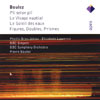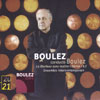Boulez (Le) marteau sans maître
A magnificent new recording of Boulez’s classic Marteau, plus a superb introduction to this major composer
View record and artist detailsRecord and Artist Details
Composer or Director: Pierre Boulez
Genre:
Vocal
Label: Apex
Magazine Review Date: 5/2005
Media Format: CD or Download
Media Runtime: 129
Mastering:
Stereo
DDD
Catalogue Number: 2564 62083-2

Tracks:
| Composition | Artist Credit |
|---|---|
| Pli selon pli |
Pierre Boulez, Composer
BBC Symphony Orchestra Phyllis Bryn-Julson, Soprano Pierre Boulez, Composer Pierre Boulez, Conductor |
| (Le) Visage nuptial |
Pierre Boulez, Composer
BBC Singers BBC Symphony Orchestra Elisabeth Laurence, Mezzo soprano Phyllis Bryn-Julson, Soprano Pierre Boulez, Composer Pierre Boulez, Conductor |
| (Les) Soleil des eaux |
Pierre Boulez, Composer
BBC Singers BBC Symphony Orchestra Phyllis Bryn-Julson, Soprano Pierre Boulez, Conductor Pierre Boulez, Composer |
| Figures-Doubles-Prismes |
Pierre Boulez, Composer
BBC Symphony Orchestra Pierre Boulez, Conductor Pierre Boulez, Composer |
Composer or Director: Pierre Boulez
Genre:
Vocal
Label: 20/21
Magazine Review Date: 5/2005
Media Format: CD or Download
Media Runtime: 69
Mastering:
Stereo
DDD
Catalogue Number: 477 5327

Tracks:
| Composition | Artist Credit |
|---|---|
| (Le) Marteau sans maître |
Pierre Boulez, Composer
Ensemble InterContemporain, Paris Hilary Summers, Contralto (Female alto) Pierre Boulez, Conductor Pierre Boulez, Composer |
| Dérive 1 |
Pierre Boulez, Composer
Ensemble InterContemporain, Paris Pierre Boulez, Conductor Pierre Boulez, Composer |
| Dérive 2 |
Pierre Boulez, Composer
Ensemble InterContemporain, Paris Pierre Boulez, Conductor Pierre Boulez, Composer |
Author: Arnold Whittall
Apart from the brief Dérive 1 for six instruments – from which, the notes assure us, Dérive 2 is not derived – this CD is notable for a new recording of Le Marteau sans maître: a score now half a century old and sounding more urgently volatile than ever in this superbly crafted performance. This is, by my reckoning, Boulez’s fifth recording of the work, and the first since the 1985 CBS version with Elizabeth Lawrence and the Ensemble Intercontemporain (10/89). This time Hilary Summers brings a highly effective quality of the farouche, as well as considerable finesse, to the vocal part: but, as often before, the thunder is stolen by the superbly characterised instrumental playing. Flute, guitar and viola are never overshadowed by the more resonant sounds of the percussion duo, and there’s the kind of edge-of-the-seat interplay which can only be achieved by players who have the music in their bones as well as under their fingers. As for the final duet for flute and metal percussion, this stands out for its incantatory gravitas, and for the hint of un-Gallic pathos that underpins its eloquence. It might not please the great composer/conductor to realise it, but Le Marteau has become a modern classic.
With the finest present-day sound quality, this DG release is outstanding in every way. Yet it still risks being upstaged by the super-budget-price Apex reissue of four of Boulez’s most imposing earlier works. True, the 1981 Pli selon pli doesn’t give you his most recent thoughts on this endlessly-evolving ‘portrait de Mallarmé’ – for that you need the definitive DG account from 2002 (7/02). But this BBC version remains a very satisfying document of its time, and a special strength of the set as a whole is the vividness with which it demonstrates what has been lost in Boulez’s complete abandonment of writing for the voice since the 1980s.
The large-scale cantata Le visage nuptial, originally composed in 1946, but performed here in the revised version from 1988-89, has an expressive incandescence and a sustained dramatic power that not only reconcile you to René Char’s convoluted verse but provoke the thought that Boulez might, after all, be contemporary music’s greatest opera composer manqué. Back in 1990, I described it as ‘probably a noble failure’, but this time round the ‘nobility’ – not the most appropriate word for so subversively dynamic a score – asserts itself irresistibly, in a supremely confident, polished performance: I doubt if the BBC Singers have ever done anything finer on disc.
More subversive dynamism can be heard in the expansive, eruptive monumentality of the orchestral Figures, Doubles, Prismes, strikingly enigmatic in its commitment to strongly sustained oppositions, and bringing back the composer’s own 1985 reading to set beside the recent version from David Robertson and the Lyon National Orchestra (Naïve Montaigne, 10/03). Add to all this the fascinating feline glitter of Le soleil des eaux and you have a ‘portrait de Boulez’ of exceptional quality.
Discover the world's largest classical music catalogue with Presto Music.

Gramophone Digital Club
- Digital Edition
- Digital Archive
- Reviews Database
- Full website access
From £8.75 / month
Subscribe
Gramophone Full Club
- Print Edition
- Digital Edition
- Digital Archive
- Reviews Database
- Full website access
From £11.00 / month
Subscribe
If you are a library, university or other organisation that would be interested in an institutional subscription to Gramophone please click here for further information.




